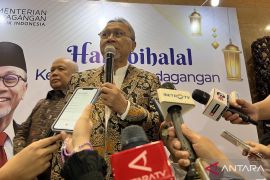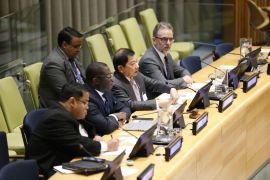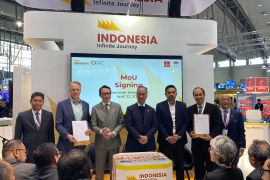JEJU, South Korea, June 10, (ANTARA/PRNewswire-AsiaNet) --
- Leading animal health company puts future of swine production on top of agenda at pivotal meeting
Bayer Animal Health used the occasion of the 22nd International Pig Veterinary Society (IPVS) Congress in Jeju, South Korea, to reveal the latest programme of activities aimed at transforming livestock production.
As part of their commitment to the advancement of knowledge in the livestockcommunity, Bayer Animal Health held the 4th International Bayer Pig Symposium in Jeju on June 10th, giving more than 200 veterinarians and swine producers from 19 countries access to the latest thinking on practical solutions to the problems raised by global changes. This was followed by a Satellite Symposium at the IPVS Congress with leading academic figures debating the future of swine production in a world of increasing consumption and decreasing natural resources.
Wolfgang Müller, Head of Global Marketing Farm Animal Products at Bayer Animal Health said "At Bayer Animal Health, we are acutely aware of the challenges facing the pig industry in the years to come: the need to deliver increased productivity in a cost-effective manner while preserving resources and protecting animal health and welfare are key issues. All parts of livestock community need to work together to meet these challenges. With these symposia and other events of their kind, we will continue to bring together local knowledge, science, innovation and global expertise to help the livestockcommunity to survive and thrive in these challenging times."
Sharing local knowledge
The 4th International Bayer Pig Symposium, chaired by Dr Bent Nielsen, Representative of the Swine Veterinary Association of Denmark, focused on sharing local knowledge to deliver practical guidance for swine producers and vets seeking to improve swine welfare and production now and for the future.
The Symposium was opened by Dr Kees Scheepens from FarmulaOne in the Netherlands, who took the audience through the basics of the new Pig Signals(R) concept whilst Dr Joaquim Segalés from the Universitat Autònoma de Barcelona, Spain presented practical tips for designing swine vaccination programmes that maximise results while minimizing costs. Dr Kyoungjin Kim of the Pig and Health Vet Group in South Korea gave an update on the current state of Porcine Epidemic Diarrhoea (PED) in South Korea, showing mortality rates in suckling pigs were up to 100%. According to Dr Kim, a new trend is being seen in PED infections in South Korea, with lower rates of mortality (20-30% versus 80-100%) appearing in suckling piglets in the 2011/12 winter season. However Dr Kim stressed that prevention is key to controlling PED, with those applying bio-security concepts seeing reduced numbers of outbreaks.
Finally, Dr Anders Holm of the Odder Veterinary Practice in Denmark took the audience through his efforts to raise awareness of coccidiosis infection in China with a 'lab-on-wheels', developed by Bayer Animal Health. Dr Holm toured China giving swine producers previously unattainable access to laboratory facilities to assess the presence of coccidiosis on their farms. According to Dr Holm, "Pig producers in China are very interested in exchanging experiences with colleagues from abroad. I also believe that European producers could learn from Chinese colleagues, as costs of buildings are reduced and diseases not yet present in Europe are frequent in China."
'Feeding the world...or saving the planet?
At the Satellite Symposium on June 11th, the need for practical guidance on maximising production value was debated by 400 veterinarians and swine producers from around the world. Entitled 'Feeding the world...or saving the planet?' the lively debate was chaired by Professor Arlette Laval, Professor of Food Animal Medicine at Nantes Atlantic College of Veterinary Medicine.
The debate gave insights into the challenges and opportunities facing swine production as population growth continues along with meat consumption levels. Dr Osler Desouzart, owner of OD consulting in Brazil, presented the case for science and technology delivering a 'Silent Green Revolution' to address the inequalities in access to quality meat proteins.
Dr Desouzart said, "The world population is forecast to continue to grow until at least 2100, but with growth focussed in the least developed areas of the planet, fair distribution of food availability will become critical."
Dr Manfred J Kern from agriExcellence GmbH in Germany, examined the need to balance environmental impact with large-scale pig production. According to Dr Kern, the greatest challenge being faced by the livestock sector will be in finding ways to minimise greenhouse gas emissions and develop a new form of 'carbon conscious pork' with a dramatically lower carbon footprint. "Veterinary medicines will play a key role, not only in ensuring that we can keep pigs healthy and thriving, but also in helping to safeguard resources by minimising losses to disease or pandemics" said Dr Kern.
Vaccine hope for Classical Swine Fever
Bayer Animal Health also took the opportunity to present further information on the development of their new vaccine for Classical Swine Fever (CSF). Posters presented by Dr Maw-Shen of the National Chung Hsing University of Taiwan, demonstrated positive efficacy results and prevention of horizontal transmission of CSF.
Transforming Livestock Production
"Our activities around IPVS are a great example of our Transforming Livestock Production commitment in action. We feel that all those who attended our events have taken away a greater understanding of the future challenges they will face, but with credible, concrete guidance on what they can do to step up and meet these challenges: letting them know that we are partners in this journey" said Wolfgang Müller.
About Bayer HealthCare
The Bayer Group is a global enterprise with core competencies in the fields of health care, nutrition and high-tech materials. Bayer HealthCare, a subgroup of Bayer AG with annual sales of EUR 17.2 billion (2011), is one of the world's leading, innovative companies in the healthcare and medical products industry and is based in Leverkusen, Germany. The company combines the global activities of the Animal Health, Consumer Care, Medical Care and Pharmaceuticals divisions. Bayer HealthCare's aim is to discover, develop, manufacture and market products that will improve human and animal health worldwide. Bayer HealthCare has a global workforce of 55,700 employees (Dec 31, 2011) and is represented in more than 100 countries. Find more information at http://www.bayerhealthcare.com.
With a turnover of EUR 1.190 million (2011) Bayer HealthCare's Animal Health Division is one of the world's leading manufacturers of veterinary drugs. The division manufactures and markets more than 100 different veterinary drugs and care products for livestock and companion animals.
Forward-Looking Statements
This release may contain forward-looking statements based on current assumptions and forecasts made by Bayer Group or subgroup management. Various known and unknown risks, uncertainties and other factors could lead to material differences between the actual future results, financial situation, development or performance of the company and the estimates given here. These factors include those discussed in Bayer's public reports which are available on the Bayer website at http://www.bayer.com. The company assumes no liability whatsoever to update these forward-looking statements or to conform them tofuture events or developments.
SOURCE: Bayer HealthCare
Editor: PR Wire
Copyright © ANTARA 2012











